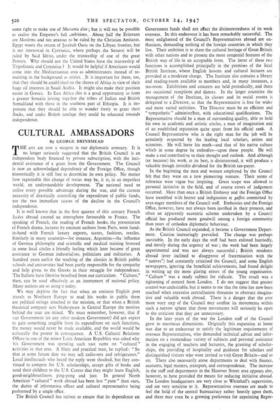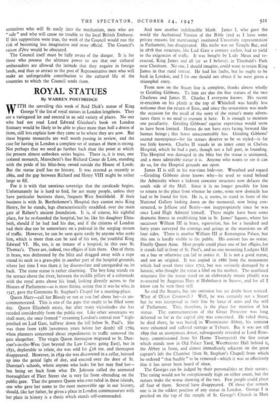CULTURAL AMBASSADORS
By GEORGE BRINSMEAD
THE arts are now a weapon in our diplomatic armoury. It is no longer seriously suggested that the British Council is an independent body financed by private subscription, with the inci- dental assistance of a 'grant from the Government. The Council is now an acknowledged dependency of the Foreign Office, though theoretically it is still free to determine its own policy. No matter how regrettable this change of status may be, it is, in an imperfect world, an understandable development. The national need to utilise every possible advantage during the war, and the current
• necessity of drastically controlling the expenditure of public funds, are the two immediate causes of the decline in the Council's independence.
It is well known that in the first quarter of this century French lycies abroad created an atmosphere favourable to France. The speaking of French, the reading of French books, the presentation of French drama, lectures by eminent authors from Paris, went hand- in-hand with French luxury exports, scents, fashions, textiles. Similarly in many countries—for instance, Argentina—the influence of German philosophy and scientific and medical training fostered in some local circles a friendly feeling which later became of great assistance to German industrialists, politicians and militarists. A hundred years earlier the teaching of the classics in British public schools and universities had been partly responsible for the sympathy and help given to the Greeks in their struggle for independence. The Italians have likewise benefited from our curriculum. "Culture," then, can be used effectively as an instrument of national policy. Many nations are so using it today.
We may deplore the fact that when an eminent English poet travels to Northern Europe to read his works in public there are political strings attached to the mission, or that when a British theatrical company acts Shakespeare in Central Europe the motives behind the tour are mixed. We must remember, however, that if our Government (or any other modern Government) did not expect to gain something tangible from its expenditure on such functions, the money would never be made available, and the world would be culturally the poorer in consequence. A U.S. Cultural Relations Officer in one of the minor Latin American Republics was asked why his Government was spending such vast sums on " cultural " activities in that area. A blunt and practical man, he replied: " So that at some future date we may sell radio-sets and refrigerators." Local intellectuals who heard the reply were shocked, but they con- tinued to compete for U.S. scholarships, accept gifts of books and send their children to the U.S. Centre that they might learn English, good-neighbourliness, ping-pong and jazz. In general North American " cultural" work abroad has been less " pure " than ours, the duties of information officer and cultural representative being performed by a single office.
The British Council has striven to ensure that its dependence on Government funds shall not affect the disinterestedness of its work overseas. In this endeavour it has been remarkably successful. The most enlightened of the Council's Representatives abroad are en- thusiasts, demanding nothing of the foreign countries in which they live. Their ambition is to share the cultural heritage of Great Britain with other nations and to present the more congenial features of the British way of life in an acceptable form. The latter of these two functions is accomplished principally in the premises of the local British Institute, where English lessons and cultural lectures are provided at a moderate charge. The Institute also contains a library and reading-room available to members and, in many instances, a tea-room. Exhibitions and concerts are held periodically, and there are occasional receptions and dances. In the larger countries the management of the Institute, its classes and its social events is delegated to a Director, so that the Representative is free for wider and more varied activities: The Director must be an efficient and " sympathetic " administrAlor, with educational qualifications. The Representative should be a man of outstanding quality, able to hold his own in academic and artistic circles, a man of imagination and of an established reputation quite apart from his official rank. A Council Representative who is the right man for the job will be genuinely respected by the leading local scholars, artists and scientists. He will leave his mark—and that of his native culture which in some degree he embodies—upon these people. He will make a real contribution to their thought and outlook. And although (or because) his work, at its best, is disinterested, it will produce a valuable though invisible dividend for the British tax-payer.
In the beginning the men and women employed by the Council felt that they were on a new pioneering venture. Their terms of reference were vague but inspiring. Great scope was allowed to personal initiative in the field, and of course errors of judgement occurred. More than once a British Embassy and the Foreign Office have trembled with horror and indignation at gaffes committed by over-eager members of the Council staff. Embassies and the Foreign Office, however, have not always been justified in their protests, and often an apparently eccentric scheme undertaken by a Council official has produced more goodwill among a foreign community than years of orthodox diplomatic behaviour.
As the British Council expanded, it became a Government Depart- ment. Caution increasingly prevailed. The change wa's perhaps inevitable. In the early days the staff had been enlisted hurriedly, and mostly during the urgency of war ; the work had been largely e,xperimental and was not always successful ; British residents abroad (ever inclined to disapprove of fraternisation with the "natives") had constantly criticised the Council, and some English newspapers, ignoring the beneficial achievements, had found delight in writing up the more glaring errors of the young organisation. "Culture" was a ready subject for ridicule. The result was a tightening of control from London. I do not suggest that greater control was undesirable, but it seems to me that the time has now been reached when excessive centralisation threatens to obstruct imagina- tive and valuable work abroad. There is a danger that the ever more wary step of the Council may confine its movements within such a narrow sphere that those movements will seriously be open to the criticism that they are unnecessary.
In the later years of the war the London staff of the Council grew to enormous dimensions. Originally this expansion at home was due to an endeavour to satisfy the legitimate requirements of overseas Representatives, who demanded technical advice and infor- mation on a tremendous variety of subjects and personal assistance in the engaging of teachers and lecturers, the granting of scholar- ships, the providing of hospitality and guidance for scholars and distinguished visitors who were invited to visit Great Britain—and so on. There also necessarily arose departments to deal with finance, accounts, legal matters, transport, and correspondence. The increase in the staff and departments in the Hanover Street area appears also, however, to have provided the means for reducing initiative abroad. The London headquarters are very close to Whitehall's supervision, and are very sensitive to it. Representatives overseas are made to feel the hold of the central bureaucracy rather heavily upon them, and there may even be, a growing preference for appointing Repre-
sentatives who will fit easily into the mechanism, men who are " safe " and who will cause no trouble to the local British Embassy. If this supposition were true, the work of the Council would run the risk of becoming less imaginative and more official. The Council's raison d'être would be obscured.
The Council itself must be fully aware of the danger. It is for those who possess the ultimate power to see that our cultural ambassadors are allowed the latitude that they require in foreign lands, and thus to attract to the post of Representative men who will make an unforgettable contribution to the cultural life of the countries to which the Council sends them.

































 Previous page
Previous page